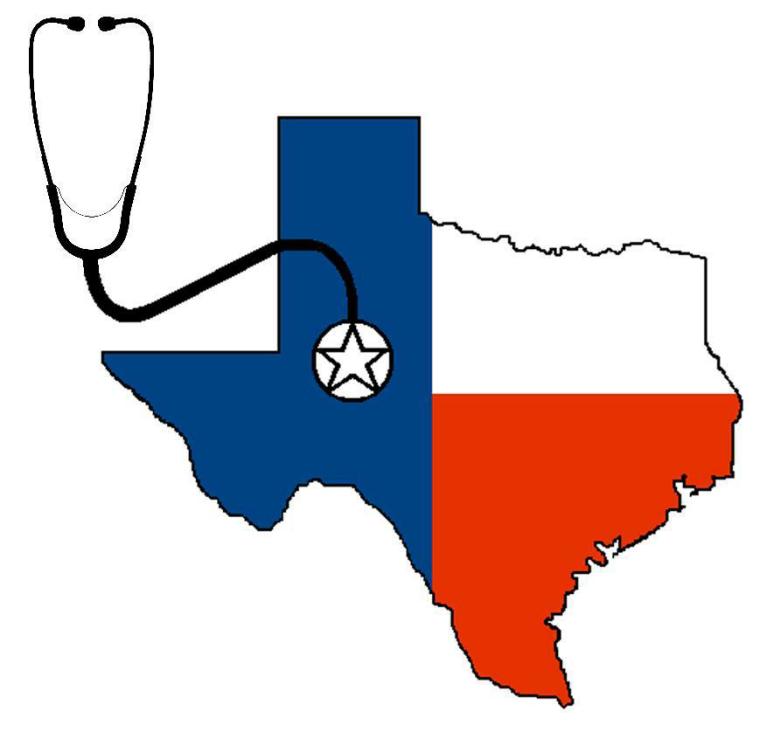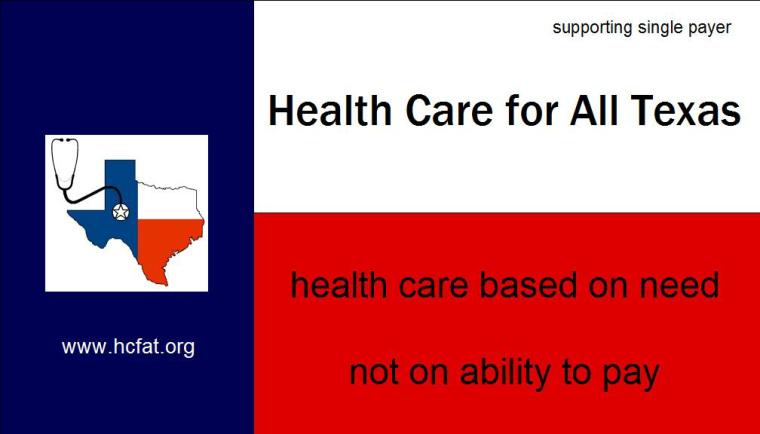Myths DEBUNKED!
Employers provide most Texans with health insurance.
Only 45.6% of Texans have employer-sponsored health insurance.
Less than 33% of small employers in Texas offer health insurance to their employees.
Texas has so many uninsured because of all the undocumented immigrants.
74% of uninsured Texans are citizens.
Undocumented immigrants drive up health costs.
Undocumented immigrants consume less health care than citizens. They are generally a healthy population, younger and able-bodied workers. Furthermore they contribute to paying for health care by paying sales and other forms of taxes.
The uninsured don’t work.
Employed Texans account for 66% of the uninsured.
There is always Medicaid for those that can’t afford private health insurance.
Texas is one of the states with the strictest criteria for adults to qualify for Medicaid. In Texas a working parent with two children who makes more than $3,396 per year makes too much money to qualify for Medicaid. Disabled adults earning more than $7,884 per year are ineligible for Medicaid. Read more about Texans' access to health at The Center for Public Policy Priorities.
If you really need health care, you can get it.
A 2009 Harvard study shows that 45,000 Americans die unnecessarily every year just because they have no health insurance. Of those, 4,675 Texans died unnecessarily because they lacked health insurance.
If people just make healthy choices, our health care costs would go down.
80% of our health care dollars are spent by the sickest 20% of the population. Making the already healthy 80% healthier, will not cut costs. Additionally, our health care system does not reward preventitive health care but does reward sick care. Primary care providers are paid far less than specialists. A single-payer health system would make preventive care economically feasible for both patients and doctors.
Source: Medical Expenditure Panel Survey Data from Thorpe and Reinhart
Health care costs can be controlled by consumer directed health care.
Consumer directed health care is the idea that if patients are more responsible for the costs of their health care through high deductibles or medical savings plans, the costs of health care will go down. This idea is based on a flawed application of commodities market principles. The theory is that if patients are "smart shoppers" of health care services or health insurance products they can lower the costs of health care. Unlike consumer goods like cars or computers or consumer services like dry cleaning or haircuts, most of us cannot choose when we will get sick or what type of illness we will get when we do get sick. Without that choice, we cannot control what health services we will need or when we will need them. Without choice, we cannot influence prices.
Competition keeps health care costs down.
- Health insurance premiums have risen 138%
- Workers share of premiums has risen 125%
- Inflation has risen 38%
- Wages have risen 39%
We have the best health care system in the world!
All other industrialized nations have better overall medical outcomes than ours. The U.S. has the lowest life expectancy, the highest infant mortality, fewer doctors and nurses per person, and shorter hospital stays of the industrialized nations. They spend half as much per person on health care than we spend and cover everyone. In fact, U.S. public health spending per capita is greater than the total spending on health care by other industrialized nations. The difference is that they do not permit for-profit health plans to play a central role in their health care systems.
Source OECD data
Universal health care is un-American because it's socialized medicine.
Our American Veterans Administration (VA) system is an example of a true socialized system because the facilities are owned by the government and the health professionals are government employees. The VA has become a premier* example of how to deliver high quality health care.
Medicare is an example of a single-payer system. A single-payer health care system is publicly financed but health care is privately delivered. Doctors and hospitals remain private. In the U.S., the efficiency of single payer would reduce overall administrative costs resulting in about $400 billion in savings each year that could go to health care, not unnecessary administrative costs.
*Archives of Internal Medicine 2006

Place your photo here.
See what Canadians are saying about the US health care system
"Dear Neighbors,
Canadians have been watching and reading about your national debate over how to reform your health care system. Normally, of course, we would not attempt to intervene or influence you. But Canadians are shocked that their health-care system -- called Medicare -- has been used to frighten Americans. Some of what has been said about our Medicare system are outright falsehoods -- like the claim that we can't choose our own doctors or that government 'bureaucrats' can deny us needed treatment."
Check Out




Health Care For All - Texas
Danish Health Care System
as described by Karsten Vrangbaek, Associate Professor
Dept. of Political Science of Copenhagen
(Commonwealth Fund, 2008)
Who is covered? All residents in Denmark are entitled to health care.
What is covered? All primary and specialist medical services are covered.
How is the health system financed? The health system is publicly financed through a centrally collected healthcare tax set at about 8% of taxable income.
How is the system organized? 99% of hospitals and health care facilities are owned by the government. The professionals who work in them, including physicians, are paid a salary by the central and local governments. General practitioners are self-employed and paid by a combination of capitation payment and fee-for-service. Non-hospital specialists are paid on a fee-for-service basis.
What is being done to ensure quality of care? Hospitals are assessed on their ability to improve how they provide care and their medical outcomes. Quality reviews are done by both an external professional accreditation body and by hospitals’ self-assessments. Quality data is published to give patients choice of hospitals and to encourage hospitals to maintain high standards.
How are costs controlled? Annual negotiations between the central and local governments determine the level of taxation and health budget. In turn, hospitals negotiate with local governments for reimbursement and monitor their level of spending. Using generic drugs, using prescribing guidelines, and making assessments of prescribing behavior and the merits of health technologies also control costs. Central, regional and local governments do assessments jointly.



Overview
Single Payer DOES
- Ensure everyone gets the high quality health care they deserve in a timely manner
- Include patients and doctors in making decisions about what treatments and what healthcare benefits should be provided
- Keep the cost of doctors’ visits, medical procedures, and pharmaceutical drugs significantly lower
- Permit significant savings from prevention and early intervention
- Cost much less for 95% of Americans
- Free businesses from the burden of providing for health care
- Free workers from "job lock" where they must stay in a unsatisfactory job situation just because they need health insurance
Single Payer absolutely does NOT
- Create a system of inferior health care
- Hurt medical research or reduce access to timely health care
- Ration care based on ability to pay for it as our current system does
- Make a few very wealthy at the expense of the health and financial security of the overwhelming majority of Americans
- Create oppressive government control over health care that results in people dying needlessly in order to save money
- Result in less choice than we currently have when for-profit private health insurers are making "medical decisions" that benefit their profit margins and do not benefit your health
Our taxes will go up!
Public financing for Medicare and Medicaid would be retained.
Employers and Employees would pay a small payroll tax on earnings. The payroll tax would replace all other employer expenses for employees’ health care. Depending on the final legislation, there may be a small income tax on the top income earners and a small transfer fee on stocks. See our calculator to estimate your savings under single-payer national health insurance.
All new taxes would take the place of all current insurance premiums, co-pays, deductibles, and any and all other out of pocket payments. The vast majority of Americans would pay less than they do now and receive much more generous health care coverage.
Single-payer system will stifle medical research and innovation!
Medical research does not disappear under universal health care. Much current medical research is publicly-financed through the National Institutes of Health.
Many famous discoveries have been made in countries that have national health care systems; for example, the CT scan was invented in England and recently, researchers in France and England were the first to discover more genes involved in Alzheimer's Disease.
Universal health care is a fine ideal, but I’ll never see it in my lifetime.
When people were asked what they'd prefer...
62% answered: "Universal health insurance program, in which everyone is covered under a program like Medicare that's run by the government and financed by taxpayers."
32% answered: "The current system, in which most people get their health insurance from private employers, but some people have no insurance."
Source: ABCNEWS/Washington Post Oct. 20, 2006
A 2008 study, found that 59% of physicians supported single-payer national health insurance (Annals of Internal Medicine 2008).
A February 2009 CBS News/New York Times poll reported that 59% of those polled favored "government run" health care.
Texans for a National Health Program